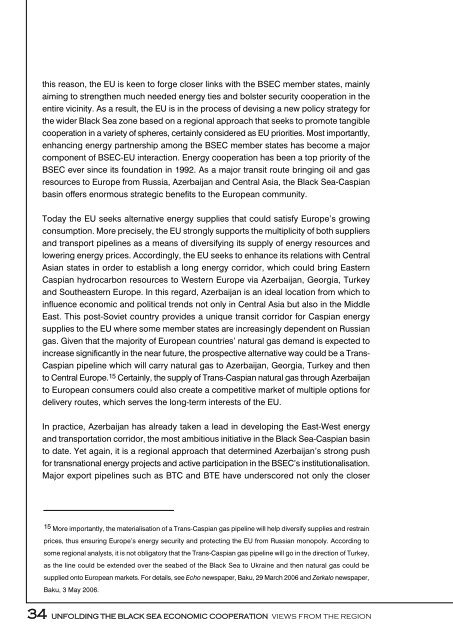Xenophon Paper 2 pdf - ICBSS
Xenophon Paper 2 pdf - ICBSS
Xenophon Paper 2 pdf - ICBSS
You also want an ePaper? Increase the reach of your titles
YUMPU automatically turns print PDFs into web optimized ePapers that Google loves.
this reason, the EU is keen to forge closer links with the BSEC member states, mainly<br />
aiming to strengthen much needed energy ties and bolster security cooperation in the<br />
entire vicinity. As a result, the EU is in the process of devising a new policy strategy for<br />
the wider Black Sea zone based on a regional approach that seeks to promote tangible<br />
cooperation in a variety of spheres, certainly considered as EU priorities. Most importantly,<br />
enhancing energy partnership among the BSEC member states has become a major<br />
component of BSEC-EU interaction. Energy cooperation has been a top priority of the<br />
BSEC ever since its foundation in 1992. As a major transit route bringing oil and gas<br />
resources to Europe from Russia, Azerbaijan and Central Asia, the Black Sea-Caspian<br />
basin offers enormous strategic benefits to the European community.<br />
Today the EU seeks alternative energy supplies that could satisfy Europe’s growing<br />
consumption. More precisely, the EU strongly supports the multiplicity of both suppliers<br />
and transport pipelines as a means of diversifying its supply of energy resources and<br />
lowering energy prices. Accordingly, the EU seeks to enhance its relations with Central<br />
Asian states in order to establish a long energy corridor, which could bring Eastern<br />
Caspian hydrocarbon resources to Western Europe via Azerbaijan, Georgia, Turkey<br />
and Southeastern Europe. In this regard, Azerbaijan is an ideal location from which to<br />
influence economic and political trends not only in Central Asia but also in the Middle<br />
East. This post-Soviet country provides a unique transit corridor for Caspian energy<br />
supplies to the EU where some member states are increasingly dependent on Russian<br />
gas. Given that the majority of European countries’ natural gas demand is expected to<br />
increase significantly in the near future, the prospective alternative way could be a Trans-<br />
Caspian pipeline which will carry natural gas to Azerbaijan, Georgia, Turkey and then<br />
to Central Europe. 15 Certainly, the supply of Trans-Caspian natural gas through Azerbaijan<br />
to European consumers could also create a competitive market of multiple options for<br />
delivery routes, which serves the long-term interests of the EU.<br />
In practice, Azerbaijan has already taken a lead in developing the East-West energy<br />
and transportation corridor, the most ambitious initiative in the Black Sea-Caspian basin<br />
to date. Yet again, it is a regional approach that determined Azerbaijan’s strong push<br />
for transnational energy projects and active participation in the BSEC’s institutionalisation.<br />
Major export pipelines such as BTC and BTE have underscored not only the closer<br />
15 More importantly, the materialisation of a Trans-Caspian gas pipeline will help diversify supplies and restrain<br />
prices, thus ensuring Europe’s energy security and protecting the EU from Russian monopoly. According to<br />
some regional analysts, it is not obligatory that the Trans-Caspian gas pipeline will go in the direction of Turkey,<br />
as the line could be extended over the seabed of the Black Sea to Ukraine and then natural gas could be<br />
supplied onto European markets. For details, see Echo newspaper, Baku, 29 March 2006 and Zerkalo newspaper,<br />
Baku, 3 May 2006.<br />
34 UNFOLDING THE BLACK SEA ECONOMIC COOPERATION VIEWS FROM THE REGION









